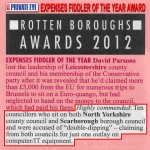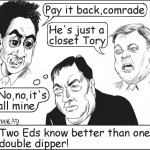Cllrs ‘money-for-nothing’ is an ‘entitlement’ – official!
- – an ‘In My View’ article – by Nigel Ward
~
IN THE PUBLIC INTEREST
I have received an email from NYCC’s Head of Legal & Democratic Services and Monitoring Officer, Carole DUNN, on behalf of the NYYC Leader Councillor John WEIGHELL and the Chief Executive Officer Richard FLINTON, in which she has expressed her predetermination (ahead of the forthcoming Standards Committee hearing) that Councillors who have received payments from more than one Council for one and the same Broadband connection have done so in accordance with their “entitlement”.
It is unclear to me how it can be that the Council has adopted rules under which the receipt of money for nothing is approved – and now, following Carole DUNN’s predetermination, tacitly encouraged..
I reproduce my response to NYCC here:
Ms Carole DUNN – Head of Legal & Democratic Services and Monitoring Officer – NYCC
Carole,Thank you for your email on behalf of John WEIGHELL and Richard FLINTON.
I am aware that the Council has in place processes for dealing with allegations that breaches of the Member Code of Conduct have occurred. Nevertheless, thank you for that information. That the Council intends to confine its considerations to those issues is difficult to comprehend, since the Council is aware that other, wider matters of conspicuous public interest are at issue and pending.
Your sentence “If you have specific allegations to make of this nature, I must ask you to set them out clearly in an email or letter, and if appropriate, they will be considered through that process” is opaque to me. What nature? How could it be anything other than appropriate for the Council to consider wrong-doing? Do you mean that if I have concerns beyond the ‘double-dipping’ you would like me to set them forth? Please specify to which matters you are referring. Thank you. I can assure you that a large number of allegations have been brought to my attention, along with supporting documentation and copious witness testimony. I shall be setting them forth for you (and the general public) as time permits.
I think you will find that I have referred to a variety of permutations in which ‘double-dipping’, ‘triple-dipping’ or even ‘multiple-dipping’ may have occurred. I have pointed out that a number of Members appear to have received Allowances in respect of one and the same Broadband connectivity from more than one Authority.
In my view, you have a duty, as Monitoring Officer, scrupulously to examine the Allowances records of all ‘two-hatted’ Members sitting on both NYCC and any of the District/Borough Councils and other institutions within NYCC’s area of governance – not only in respect of Broadband Allowances, but also regarding subsistence, accommodation and travel, and whatsoever other Allowances are provided by the Council. I believe you will encounter a number of abuses.
Your third paragraph appears to dedicate itself to expressing your predetermination on the matter of the ‘double-dipping’ complaints. Specifically:
“Members are entitled to allowances from the various Authorities in which they are involved in accordance with the allowance schemes.”
“Entitled”. In plain language, you have asserted that your predetermined opinion is that Members are “entitled” to receive Allowances from as many Authorities as they wish in recompense for one and the same facility – always providing that they are Members of those Authorities and that the relevant ‘rules’ of those Authorities make no reference to sums received from other bodies. You express no equivocation on the matter.
Your statement amounts to a predetermination of exculpation of those Councillors against whom complaints have been made. Clearly, the Members of the Standards Committee cannot now be assured of an unbiased report from which to commence their deliberations.
You have ignored repeated requests for sight of the Protocol governing your own conduct – thus depriving me of the means to assess whether or not you have acted beyond your authority – ultra vires. This deprivation leads me to conclude that you are attempting to conceal. You will oblige me by providing a copy of the Protocol governing the conduct of the Head of Paid Service, the Chief Financial Officer and the Monitoring Officer, by return. Thank you.
You will please note my extreme dissatisfaction on this point. I regard it as evidential of the fact that the Council, as an institution, is committed to proceeding in a prejudiced manner, ostensibly to shore up its sliding reputation, but in fact dooming it to continuing criticism.
In recent days, three Portfolio Holders have expressed their concerns to me, citing the so-called “10-80-10 Rule”. The Rule (with which I am sure your a familiar) asserts that:
- 10% of elected members voluntarily place their acumen and integrity at the service of the community, as a check and balance against the hegemony of the Executive Officers.
- 80% are severely challenged by the complexity of the Council’s dealings, but are reluctant to admit as much – or to forego the perceived kudos and financial benefits of Membership.
- 10% are self-serving opportunists.
It is these latter 10% who are the now coming under close scrutiny from myself and others. I see no plausible reason why the Council should take issue with that purpose. In point of fact, the Council’s recalcitrance in addressing these matters (the ‘double-dipping’ has been on the table for half a year now) betrays an apparent fear that far greater infractions (crimes) have gone thus far undetected and must, at all costs, be concealed. That falls some way short of the standard to which the Council aspires.
Quite aside from the disrepute these matter may bring upon the Council in respect of the public perception of its commitment to fairness, transparency and accountability, the Standards Committee may well feel that, in the present socio-political climate of cuts, limited hours and redundancies, the purely self-serving nature of ‘double-dipping’ (and the manifest disgust with which the public views such excesses) bears close consideration in any just resolution of the matter.
It is difficult to see how the Council resolving to allow Members to receive money for nothing could conceivably be claimed to best serve the Public Interest, or provide ‘Value for Money’.
I well remember – it was the November of 2010 – when Peter Stringfellow, the celebrated night club impressario, wrote to Iain Duncan Smith (Conservative) “renunciating” the cold-weather payment to which he was “entitled”:
Peter Stringfellow has written to the Work and Pensions Secretary Ian Duncan Smith asking him to halt his “totally unnecessary” pensioner’s winter fuel allowance.
Speaking from his home in Majorca, he added: “When they send you notification that they will be sending you the money, they should give you an option to say you don’t want it. It is a very small thing to do.
That, surely, is an example that the Public Interest would require the Councillors to embrace. And Councillors were – from the outset, remember? – given an option to say they don’t want it. That would have been honourable and prudent; the elections are only eight months away.
I also recall the Parish Poll in Whitby in June 2009 when County Councillor Jane Kenyon bemoaned the expenditure associated with that fundamental democratic process in these rather trite words:
Borough and County Coun Jane Kenyon added: “Is this value for money, what price democracy?
“This money could have been better spent on play equipment for children or services for the elderly to improve their quality of life – at a just over 5% turnout is this just democracy for democracy’s sake?”
“Value for money”? “Better spent on play equipment for children or services for the elderly”? “Democracy for democracy’s sake”? How facile – when, in fact, Councillor Kenyon has shamelessly taken around £1,300 per annum for services costing her perhaps £250 – in strict accordance with her “entitlement” to receive over £1,000 per annum – money for nothing?
As Monitoring Officer, does it enter your remit to monitor the tax implications of that? I would like a clear explanation of that point, please. Thank you.
I remind you again of the terms of the Members’ Allowance Scheme Guidelines:
6. Renunciation
A councillor may by notice in writing given to the Corporate Director – Finance and Central Services elect to forego any part of his entitlement to an allowance under this scheme.
Details of where a Councillor has chosen to renunciate all or a part of their allowances, is recorded in the annual statement of Members allowances and expenses.(Granted; the underling is mine).
It is thus made abundantly clear that the methodology exists (and its existence had been made known to Members) that they could avoid the morally repugnant opportunism of ‘double-dipping’ by the simple expedient of giving “notice in writing”, by email (if they so wished) via the internet connection for which they had already been adequately compensated from another Authority – SBC – instead of which, they have persisted, year on year, to accept money for nothing.
And now you declare your predetermination that such was their “entitlement”. No blame.
To suggest that ‘double-dipping’ is in any way acceptable at any time – much less in these straitened times – is disreputable in the extreme. To suggest that receiving money twice for the same service is in any way justifiable as an “entitlement” is one of the most arrogant and insensitive remarks that I have ever had the misfortune to read.
I am reminded of Mr Robert Goodwill MP (Conservative) and his gloating response following his exposure in respect of his expenses claim for double the price paid for his airline ticket – another form of ‘double-dipping’:
“I can pocket the difference and, as a capitalist, also a British Conservative, I see it as a challenge to buy cheap tickets and make some profit on the system.”
‘Make some profit on the system”. Your predetermination that Members accepting money for nothing, under the system adopted by the Councils, is no more than their “entitlement”, is manifestly morally bankrupt and most certainly brings disrepute upon yourself and your Council.
You will oblige me by recording a complaint against yourself on those grounds. Thank you.
I have grounds for other complaints against you, and members of your staff, and I will set them forth in due course.
I draw your attention to the following extract from the recent government directive Local Authorities (Executive Arrangements)(Meetings and Access to Information)(England) Regulations 2012 – Recording decisions;
Recording of Executive decisions made at meetings
The regulations require that all Executive decisions made at meetings must be recorded in a written statement , which must include the following:
- A record of the decision and the date it was taken
- The reasons for the decision
- Details of alternative options considered at the meeting and rejected
- Any conflicts of interest declared
- A note of any dispensation issued by the Head of Paid Service in relation to conflicts of interest declared
The wording of this part of the regulations is unusual, in that it introduces a new category of declarable interests and a new form of dispensation, neither of which match or appear in the provisions of the recently introduced Code of Member Conduct, and must therefore be considered in addition to them.
The written statement must be produced as soon as reasonably practicable after the conclusion of the meeting, published on the Council’s website and made available at its offices.
Please provide details of this “new category of declarable interests” within the coming seven days. Thank you.
Meanwhile, I await confirmation that the long-overdue visit from an impartial Investigating Officer (other than Mr Stephen KNIGHT, against whom I will also be lodging complaints in due course) is imminent. Please inform me, by return, of the name of the replacement Investigating Officer and the date and time of the interview. Thank you.
Kind regards,
Nigel


























Comments are closed.